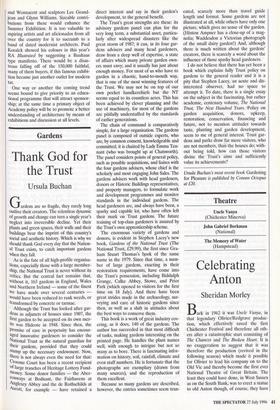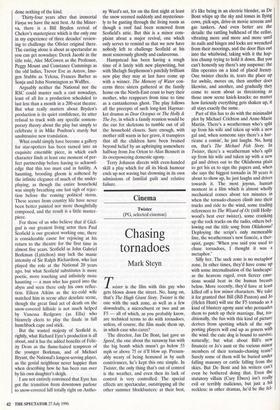Theatre
Uncle Vanya (Chichester Minerva) John Gabriel Borkman (National) The Memory of Water (Hampstead)
Celebrating Anton
Sheridan Morley
Back in 1962 it was Uncle Vanya, in that legendary Olivier/Redgrave produc- tion, which effectively saved the first Chichester Festival' and therefore all oth- ers after a catastrophic start consisting of The Chances and The Broken Heart. It is no exaggeration to suggest that it was therefore the production (revived in the following season) which made it possible for Olivier to lead his company on to the Old Vic and thereby become the first ever National Theatre of Great Britain. The least they could have done, in West Sussex as on the South Bank, was to erect a statue to old Anton though, of course, they have
done nothing of the kind.
Thirty-four years after that immortal Vanya we have the next best. At the Miner- va, there is a Bill Bryden revival of Chekov's masterpiece which is the only one in my experience of three decades' review- ing to challenge the Olivier original there. The casting alone is about as spectacular as you can get nowadays: Derek Jacobi in the title role, Alec McCowen as the Professor, Peggy Mount and Constance Cummings as the old ladies, Trevor Eve as Astrov, Imo- gen Stubbs as Yelena, Frances Barber as Sonja and John Normington as Waffles.
Arguably neither the National nor the RSC could muster such a cast nowadays, least of all for a production scheduled to last less than a month in a 200-seat theatre. But what really matters about Bryden's production is its quiet confidence, its utter refusal to truck with any specific contem- porary theory about the play but simply to celebrate it in Mike Poulton's sturdy but unobtrusive new translation.
What could simply have become a gallery for star-spotters has been turned into an exquisite ensemble piece, in which each character finds at least one moment of per- fect partnership before having to acknowl- edge that this too must end in futility. A haunting, brooding gloom is softened by the infinite elegance of much of the under- playing, as though the entire household was simply breathing one last sigh of rejec- tion before the coming political storm. These scenes from country life have never been better painted nor more thoughtfully composed, and the result is a little master- piece.
For those of us who believe that if Giel- gud is our greatest living actor then Paul Scofield is our greatest working one, there is considerable cause for rejoicing at his return to the theatre for the first time in almost five years. Scofield as John Gabriel Borkman (Lyttelton) may lack the manic intensity of Sir Ralph Richardson, who last played the role at the National 20 years ago, but what Scofield substitutes is more poetic, more touching and infinitely more haunting — a man who has gazed into the abyss and seen there only his own reflec- tion. Eileen Atkins as the ice-cold wife matched him in scene after desolate scene, though the great final act of death on the snow-covered hillside is not much helped by Vanessa Redgrave (as Ella) who bizarrely elects to play the finale in full hunchback cape and stick.
But the wasted majesty of Scofield is, rightly, what Richard Eyre's production is all about, and it has the added benefits of Felic- ity Dean as the flame-haired temptress of the younger Borkman, and of Michael Bryant, the National's longest-serving player, as the genial neighbour never happier than when describing how he has been run over by his own daughter's sleigh.
I am not entirely convinced that Eyre has got the transition from downtown parlour to snow-covered hill totally right on Antho-
ny Ward's set, for on the first night at least the snow seemed suddenly and mysterious- ly to be gusting through the living room as though a roof had been removed from Scofield's attic. But this is a minor com- plaint about a major revival, one which only serves to remind us that we now have nobody left to challenge Scofield at his most sonorously ghostly and cadaverous.
Hampstead has been having a rough time of it lately with new playwriting, but with Shelagh Stephenson's patchily brilliant new play they may at last have come up with a winner. The Memory of Water con- cerns three sisters gathered at the family home on the North-East coast to bury their mother, who reappears from time to time as a cantankerous ghost. The play follows all the precepts of such long-lost Haymar- ket dramas as Dear Octopus or The Holly & The Ivy, in which a family reunion would be the cue for skeletons to tumble out of all the household closets. Sure enough, with mother still warm in her grave, it transpires that all the children have been bruised beyond belief by an upbringing somewhere halfway from Joe Orton to Alan Bennett in its overpowering domestic agony.
Terry Johnson directs with even-handed skill a play which for all its bleak humour ends up not waving but drowning in its own admissions of familial guilt and relative failure.



























































 Previous page
Previous page